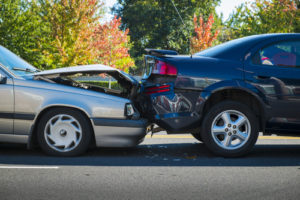
Multi-vehicle car accidents often result in serious injuries and property damage for multiple people. The chaos of a multi-vehicle accident may make it difficult to determine who may have been at fault for the crash, while the extensive damages and injuries resulting from the crash may be too much for any one at-fault party to realistically pay for.
What is a Multi-Vehicle Accident?
A multi-vehicle accident typically refers to any crash where more than one vehicle collides with another, such that three or more vehicles are involved in the accident. Most often, a multi-vehicle accident occurs when two vehicles collide with one another, with those vehicles then careening off from the point of collision to hit other nearby vehicles in a chain-reaction. One common example of a multi-vehicle accident involves one vehicle rear-ending another vehicle, with the rear-ended vehicle pushed forward into the back of the vehicle in front of it, and so on.
Read more: The Driver Who Hit Me Doesn’t Have Insurance. What Should I Do?
Determining Liability for a Multi-Vehicle Crash
Depending on the circumstances of a multi-vehicle accident, blame and liability for the accident will often fall on the driver that triggers the first collision. In the example of the chain-reaction rear-end crash, the driver all the way in the back who caused the first rear-end collision will usually be held for each rear-end crash in the chain.
Of course, there can be circumstances that may reduce or cut off the liability of the driver who causes the first collision for subsequent impacts in a multi-vehicle crash. For example, another driver may have kept the accident going by speeding, being distracted, or making a negligent error in attempting to avoid the pile-up and causing a crash with yet another driver.
Read more: What Happens If Someone Hits My Car From Behind?
Evidence Used in Multi-Vehicle Accident Claims
Multi-vehicle car accidents may require close examination of evidence to determine fault for the crash. Examples of evidence reviewed in multi-vehicle accident cases include:
- Nearby surveillance video
- Dashcam footage
- Police accident reports
- Accident scene photos
- Vehicle damage reports, and examinations of the vehicle for potential mechanical failures caused by defects
- Eyewitness statements
Lawyers handling multi-vehicle car accident cases will often hire accident reconstruction experts to go over this and other evidence to determine, based on scientific principles, how the accident occurred and unfolded and thereby identify the party or parties that bear legal liability for the accident.
Comparative Fault in Multi-Vehicle Crashes
Comparative fault is an important concept in multi-vehicle car accidents. Florida follows the comparative negligence rule, meaning that having some fault for your accident and injuries is not a bar to you filing a claim for compensation against other parties who also share fault for your injuries. Where fault for a multi-vehicle crash doesn’t fall entirely on the first driver but instead other drivers contributed to the crash, those other drivers can also be held responsible (and can also seek partial compensation from other at-fault drivers as well). In some circumstances, another driver’s negligence may have kept a multi-vehicle accident going when it otherwise would not have, cutting off the first driver’s liability for damages and injuries that arise from the subsequent driver’s negligence.
Read more: Answers To Your Most Common Questions About Florida Car Accidents
Contact a Fort Lauderdale Personal Injury Lawyer to Discuss Your Car Accident Case in Florida
Did you or a loved one sustain serious injuries due to a car accident in Florida? Don’t let the medical bills pile up while you wait for the negligent party or their insurance company to do the right thing. Right now, you need an aggressive personal injury attorney on your side, fighting to get you the compensation you need, want, and deserve. The skilled attorneys at Lawlor, White & Murphey represent clients injured because of car accidents in Fort Lauderdale, Pembroke Pines, Weston, Pompano Beach, Plantation, and throughout Florida. Call 954-525-2345 or fill out our online contact form to schedule a free consultation about your case. We have an office conveniently located at 2211 Davie Boulevard, Fort Lauderdale, FL 33312, as well as offices in Pembroke Pines, Weston, Coconut Creek, Plantation, and Pompano Beach.
The articles on this blog are for informative purposes only and are no substitute for legal advice or an attorney-client relationship. If you are seeking legal advice, please contact our law firm directly.
